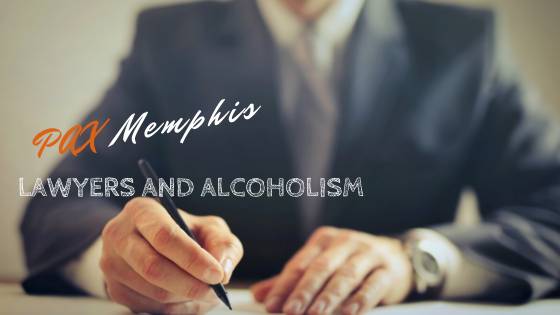There are several professions in which alcoholism and substance abuse seem to be more prevalent than others. For example, rates of alcoholism are thought to be significantly higher in the career fields of first responders, veterans, and lawyers. Stress, strenuous work environments, and the potential for PTSD often lead to self-medication for many professionals in these specific occupations. As a result, lawyers experience alcoholism at staggering rates.
According to a study published by the American Bar Association, as many as one in five lawyers is a problem drinker, which is twice the national average. Nearly 21% of participating lawyers and judges had struggled with alcohol use disorder. While this profession offers incredible advantages in status and financial stability, the dark side to practicing lawyers and alcoholism is commonly intertwined.
Symptoms of Alcohol Use Disorder in Lawyers
Symptoms of alcohol use disorder can be mild, moderate, or severe depending on the number and severity. If you are a member of the legal profession and concerned you may be developing a dependency or addiction to alcohol, here are a few of the symptoms to look out for:
- Inability to control the amount of alcohol you drink
- Feeling a strong urge or compulsion to drink
- Increasing tolerance to alcohol so that you must consume greater amounts of alcohol in order to feel its effects
- A lingering smell of alcohol
- Avoidance when you ask if there’s a problem with alcohol
- Having legal problems or issues within relationships, employment, school, finances or other responsibilities due to drinking.
- Drinking in isolation or hiding your drinking
- Experiencing physical withdrawal symptoms such as nausea, sweating, shaking, fatigue, body aches, or seizures when you don’t drink.
- Mood changes such as irritability or apathy
- Changes in work quality or productivity
- Unable to remember conversations, commitments, or events – blacking out
- Scheduling your day around your drinking and becoming annoyed when this ritual is disturbed or questioned
- Losing interest in activities, hobbies, and family functions that used to bring you pleasure
- Irritability when your usual drinking time nears, especially is alcohol is unavailable
- Keeping alcohol hidden in unlikely places at home, at work, or in your car
- Gulping drinks, ordering doubles, drinking to get drunk, or drinking to feel “normal”
Why is the Alcoholism Rate for Lawyers So High?
The intensity of law school and the competitive, high-stress nature of the legal profession are well-known. Therefore, it is no surprise that lawyers use alcohol as a coping mechanism while working in the legal profession. The law attracts hard-working, dedicated, and ambitious people, often prioritizing success over personal well-being.
One of the theories surrounding why the alcoholism rate for lawyers is so high is that many lawyers, particularly those working in a firm, are part of a culture that embraces drinking, socializing, and even incorporating these events as part of work with client meetings. It is not uncommon for lawyers to get together for a lunch meeting that includes a round or two of drinks during the day. Furthermore, many legal professionals get together after a stressful day to attend events involving alcohol to help cope with their stressful day.
Another potential contributing factor to the staggering numbers of lawyers struggling with alcoholism is the pressure from law school. Many law students often experience mental health issues during law schools such as depression and anxiety. These are mostly triggered by the rigorous and competitive nature of this specific type of schooling. There is a strong link between mental health disorders and alcoholism, and may law students may begin self-medicating during the tiresome schooling which ultimately carries over into their initial years of practice.
When it comes to younger lawyers, along with culture and the competitive market, there is also a theory that while the number of well-paying jobs is on the decline, the cost of legal education continues to increase. It is not uncommon for lawyers to graduate with more than $100,000 in debt, adding more stress to an already stressful profession.
Here are a few other stressors that often contribute to lawyers and alcoholism:
- Excessive workloads
- Intense competition
- Perfectionism
- Long hours of study
- Enormous amounts of stress
- Student loan debt
- Colleague peer pressure
- Underlying co-occurring mental health disorders
- Difficult moral dilemmas
- A culture that embraces drinking as a means of socializing and networking
- Pressure for results from superiors
Alcohol Rehab for Lawyers and Other Legal Professionals
The stigma of alcoholism does not discriminate. Individuals and businesses are learning to adapt their attitudes toward this disease. Now, many law firms and other organizations offer programs and treatment options to help lawyers deal with their alcoholism. Some of these employers even offer paid time off to attend alcohol rehab or a company-funded addiction treatment program. The first and most important step is to ask for help.
At PAX Memphis, we offer evidence-based alcohol addiction treatment for legal professionals struggling with the disease of alcoholism. Our compassionate team understands the specific stressors you encounter in this highly competitive field and we create a program that specifically addresses your individual needs. Win back your health and your career now, contact us today to find out how!
Medically Reviewed: September 25, 2019

All of the information on this page has been reviewed and verified by a certified addiction professional.










